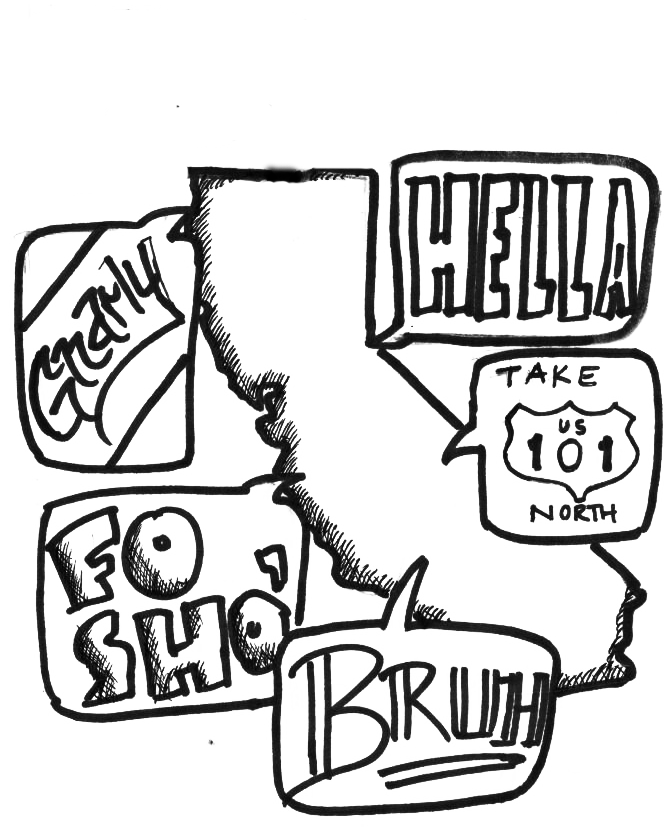
In the present day, nobody would use the phrase “Why, thou deboshed fish thou” as an insult, because insults only function when they are significant to both people. Language generally requires a common understanding between individuals, which also means that when the individuals establish a different meaning, it leads to the formation of what is known as colloquial language or slang.
California as a whole is notorious for its vernacular, being such a large state with a diverse assortment of communities yet isolated by geography. Noting the differences, Matthew McClary, a junior at Ramona High School in Southern California, says, “Northern California seems to be a completely different realm. I automatically associate my home and thus California with hot weather, beaches, desert, and Disneyland — all of which NorCal doesn’t have.”
The differences derived from geography are reflected in the unique dialect that serves to both differentiate each region from other regions and to unify those within it. McClary continues, “The only time we use ‘hella’ is when we use it to mock family and friends from the Bay Area, as it grants us petty satisfaction within our own community.”
When asked to describe the route to San Francisco from San Mateo, Joshua Arguelo, a Southern Californian and a senior at Wildwood High School, said to “take the 101 northbound” initially, while Brian Villanueva, a Northern Californian and junior at Amador High School, merely said to “take 101 northbound.” By ignoring the article “the,” Villanueva, warps the regulations of proper grammar because it is accepted. The removal of the article also changes the associated worth of the freeway, as Southern Californians subconsciously place more value on the freeway itself while the Northern Californians indicate a preference for an efficient retelling of directions. This approach to the phrase contributes to specific mental outlook on broader concepts, for the use of “the” primes those who speak the vernacular to pay attention to the phrasing of different statements.

At Aragon specifically, regional colloquial language is dominated by “hella,” but use differs based on context. Senior Anthony Vo says, “If something is genuinely cool or impressive, I’d use ‘gnarly’ un-ironically.”
In terms of vernacular, specific social identity tends to outweigh specific geographic positioning, leading to a fluctuation in a specific regional vernacular that serves to form social community, even as those on the outside might prefer to generalize it to everyone. Senior Christina Tan Zun says, “The words people use allow me to make assumptions about their behavior.”
Of course, specific words like “hella” and “gnarly” associated with California and have become mainstays in the English language, but originated with specific demographics and spread through word of mouth and convenience of communication. The idea behind the word propels it to common usage, and its roots enable the association of identity with it, allowing for the progression of specific culture.
New words and phrases, or at least the ideas behind them, can be thought of as “memes” — defined as units of cultural evolution (think of a gene for culture and society). These memes allow for the progression of society, for new, relevant memes replace the older memes until individual cultures are left only with the memes that are best suited for communication and unique characterization. “Hella,” which originated in the 1970s, would be considered a good meme for Northern California while “fosho” might be considered a flawed meme, having died out fairly quickly.
Now, the more common association with the word meme as associated with the internet demonstrates how the Internet has simultaneously formed its own community with its own vernacular while permitting the expansion of dialects, spreading memes to a variety of individuals. This in turn, exposes others to the vernacular, resulting in a giant meme fest that helps lead to the standardization of words and concepts — or at very least an increasing familiarity with them. With the new platform, regional memes, which may have been rejected by mass culture, may be accepted in smaller communities — successful in their own right.




